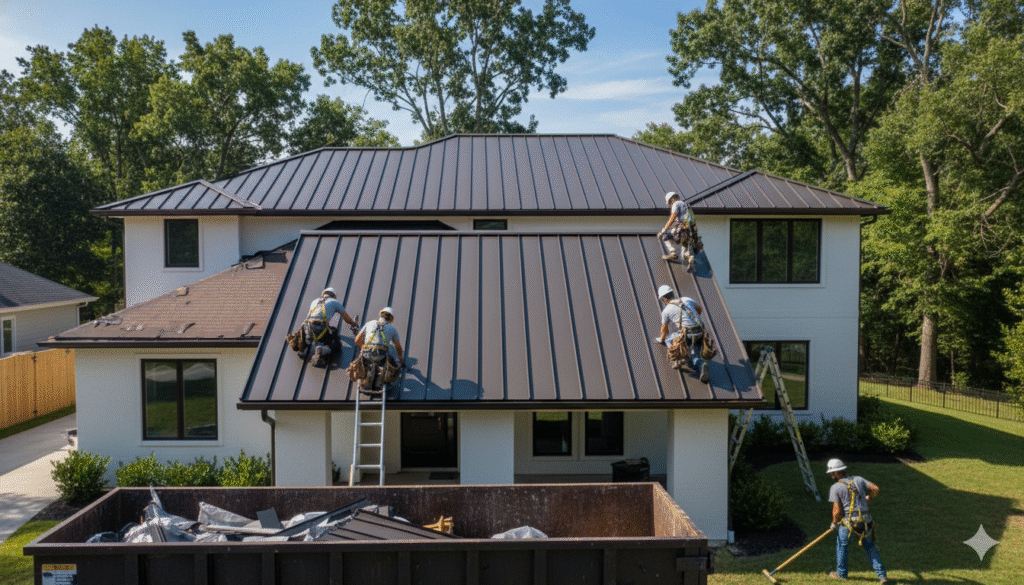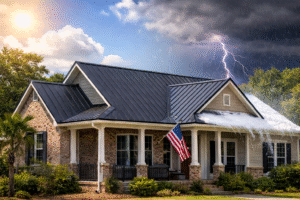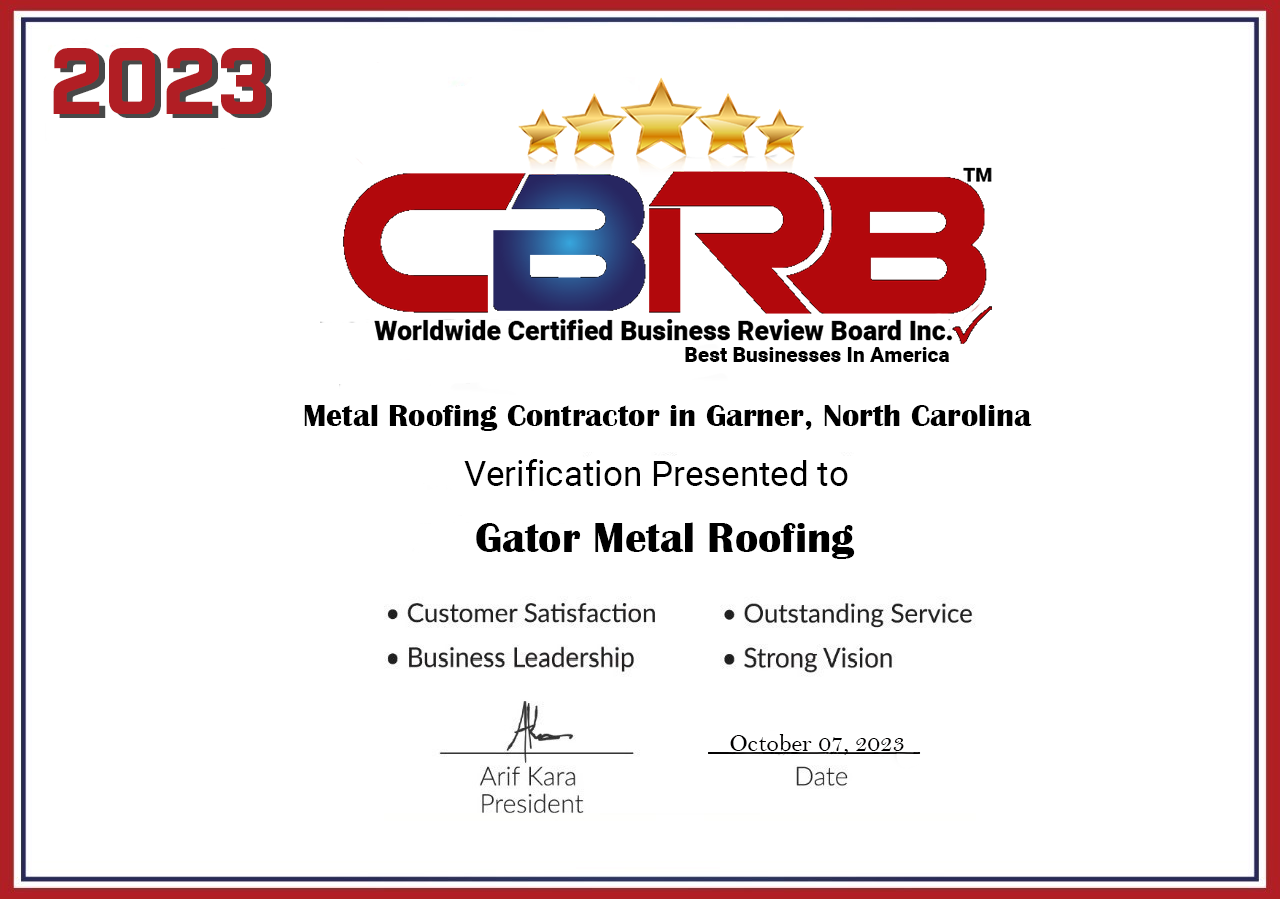
Investing in a new roof is one of the most significant decisions a homeowner can make, and when that investment is in a durable, long-lasting metal roof, you want to ensure you’re making the right choices every step of the way. Choosing the right contractor is paramount to a successful project. A reputable, experienced contractor will not only deliver a high-quality installation but also provide peace of mind throughout the process.
To help you navigate this crucial selection, here are key questions to ask potential metal roofing contractors. Their answers will not only give you insight into their expertise and professionalism but also help you compare bids effectively.
1. Are You Licensed, Bonded, and Insured?
This is non-negotiable. A contractor should always be able to provide proof of their licensing, bonding, and insurance.
-
Licensing ensures they meet local and state requirements to perform work in your area.
-
Bonding offers financial protection in case the contractor fails to complete the job or meet other contractual obligations.
-
Insurance, specifically liability and workers’ compensation, protects you from financial responsibility if an accident occurs on your property during the project. Without adequate insurance, you could be held liable for injuries or damages.
Red Flag: Any hesitation or inability to provide current documentation for these crucial items.
2. How Much Experience Do You Have Specifically with Metal Roofing?
While a contractor might have extensive experience with asphalt shingles, metal roofing requires specialized knowledge and installation techniques. Ask about:
-
Years in business: How long has their company been operating?
-
Metal roofing specific experience: How many metal roofing projects have they completed? What percentage of their overall business is metal roofing?
-
Installer training: Are their installation crews specifically trained and certified for metal roof installations? Do they attend ongoing training?
Why it matters: Improper installation of a metal roof can lead to leaks, reduced energy efficiency, and a shorter lifespan, negating many of the benefits of choosing metal.
3. Can You Provide References and Examples of Your Work?
A trustworthy contractor will be proud to showcase their past projects and connect you with satisfied clients.
-
References: Ask for contact information for at least three recent metal roofing clients. When you call them, ask about the contractor’s professionalism, communication, adherence to timelines, and satisfaction with the finished product.
-
Portfolio: Request to see photos or, even better, addresses of completed metal roofing projects in your area. This allows you to visually inspect their quality and see how different metal roofing styles look in real-world settings.
What to look for: Consistency in quality across different projects and positive feedback from references.
4. What Type of Metal Roofing Materials Do You Recommend and Why?
A good contractor will be knowledgeable about various metal roofing materials (e.g., steel, aluminum, copper, zinc) and profiles (e.g., standing seam, metal shingles, corrugated). They should be able to:
-
Explain the differences: Detail the pros and cons of each material in terms of cost, durability, aesthetics, weight, and suitability for your climate.
-
Justify their recommendation: Based on your home’s style, your budget, local weather conditions, and your aesthetic preferences, they should clearly explain why a particular material or profile is the best fit for your needs.
Insight: This question gauges their expertise and whether they are trying to upsell you on a more expensive product or genuinely offering the best solution.
5. What Does Your Warranty Cover (Both Material and Labor)?
Metal roofing typically comes with excellent warranties, but it’s crucial to understand what’s covered by the manufacturer and what’s covered by the installer.
-
Material Warranty: This comes from the metal manufacturer and often covers defects, chipping, fading, or peeling for 30-50 years, or even a lifetime. Understand the specifics of what voids the warranty.
-
Workmanship Warranty: This is provided by the contractor and covers the quality of their installation. A robust workmanship warranty typically ranges from 5-10 years, though some reputable contractors offer longer periods.
Crucial Point: Get both warranties in writing and understand the conditions, exclusions, and how to file a claim.
6. What is Your Project Timeline and How Do You Handle Unexpected Issues?
Understanding the expected duration of the project helps you plan.
-
Start and completion dates: Get a realistic estimate. Weather delays are common with roofing, so ask how they communicate and manage these.
-
Daily schedule: What are their typical working hours?
-
Contingency plans: How do they handle unforeseen issues like rotten decking, unexpected structural problems, or additional repairs that might arise once the old roof is removed? What is their process for communicating these issues and getting your approval for additional costs?
Expectation Management: Clear communication about timelines and potential hurdles prevents frustration.
7. What is Your Clean-Up Process?
A roofing project can be messy. A professional contractor will have a thorough clean-up plan.
-
Daily cleanup: Will they clean up debris at the end of each workday?
-
Final cleanup: What does the final cleanup entail? This should include removing all roofing debris, nails (using magnetic sweeps), and protecting your landscaping.
-
Waste disposal: How do they dispose of old roofing materials?
Pet Peeve Prevention: Nobody wants to find nails in their driveway or flowerbeds months after the project is complete.
8. What is the Total Cost, and What Payment Schedule Do You Use?
Get a detailed, written estimate that breaks down all costs.
-
Itemized costs: This should include materials, labor, permits, disposal fees, and any optional upgrades.
-
Payment schedule: A reasonable payment schedule typically involves a down payment (often 10-30%), with subsequent payments tied to project milestones, and the final payment due upon completion and your satisfaction. Be wary of contractors demanding a large percentage upfront.
Transparency is Key: Ensure there are no hidden fees and that you understand exactly what you’re paying for.
By asking these comprehensive questions, you’ll be well-equipped to choose a metal roofing contractor who is professional, experienced, and committed to delivering a high-quality, long-lasting roof that protects your home for decades to come. Don’t rush the process; thorough due diligence upfront will save you headaches and expenses in the long run.









